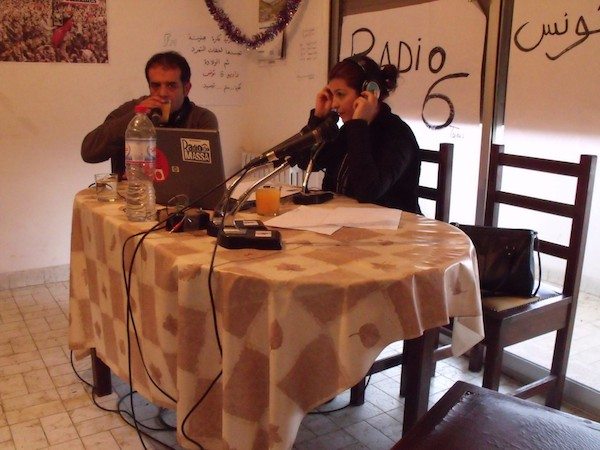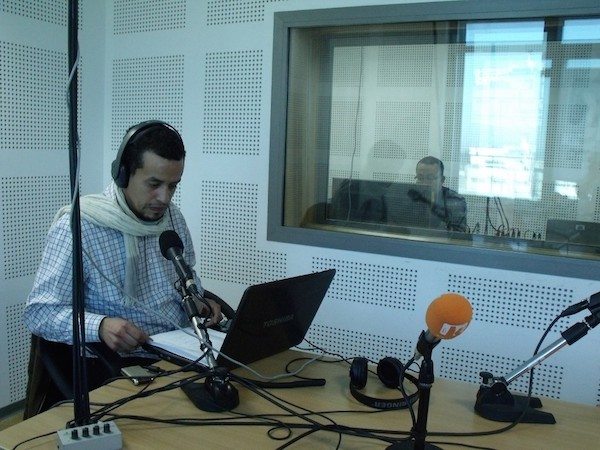Radio free Tunisia

Tunisia’s revolution has not kept all of its promises to liberalise the media — and in particular, the country’s radio stations. Confronted with institutional obstacles, certain independent radio stations have decided to circumvent them.
In the luxurious surroundings of Tunis’ Majestic hotel, five people listen attentively to Pete Tridish around a table covered with electronic parts, circuit boards and soldering irons. A former cyber activist, this native of Philadelphia teaches them how to assemble a pirate radio transmitter, used to “chop” the FM band and appropriate a radio frequency. The students participating in this workshop are members of the Worldwide Association of Community Radio Broadcasters (AMARC). There are Tunisians, but also some Moroccans like Mohamed, who works for the web portal e-joussour, and Egyptians such as Fatemah, who launched a local and citizens’ media project last September.
The scene is somewhat surprising in post-Ben Ali Tunisia, where hopes were high for the liberalisation of a media landscape that had long been muzzled.
The scene is somewhat surprising in post-Ben Ali Tunisia, where hopes were high for the liberalisation of a media landscape that had long been muzzled. And yet, it is clear that the revolution has not fully succeeded in freeing the airwaves. Before January 14, the market was shared between the publicly owned Radio Tunis and four private stations viewed favourably by the regime: Shems FM, Mosaique FM, Express FM and Jawhara FM.
Five months after the fall of the dictator, the National Forum for Information and Communication Reform (INRIC), established by the new authorities, decided in favour of the authorisation of 12 private radio stations. Many of them, however, have still not received the licenses granting them a frequency. Among the stations in waiting are Sawt El Manajem (the Voice of Mines) and Radio 6.

Launched online in 2007, Radio 6 calls itself “the first independent radio project” in the country. Because of its rebellious tone, its location had been a carefully guarded secret under the regime of Ben Ali and its reporters were subjected to police surveillance and summary arrests. And now, with Ben Ali ousted from power, Radio 6 has fallen silent on the FM band.
“The problem is that Tunisia’s new laws do not differentiate between commercial and community radio. To obtain a frequency, the ONT [the national broadcasting office] demands 120,000 dinars [60,000 euros] per year from each station,” says Mohamed Ben Nozha, the co-founder of Radio 6, along with Sala Fourti, a human rights activist. “It’s a legacy of Ben Ali’s laws preventing media proliferation.” Rather than pay the exorbitant sum, the Radio 6 team opted for pirate broadcasting beginning February 14, 2012. Today, it is based in a small apartment in the Tunis neighbourhood of Menzah VII and is broadcast via an old transmitter purchased in France.
Radio 6 calls itself “the first independent radio project” in the country.
For its part, Radio Kalima chose to follow the legal route. Founded in 2008 by a couple, Sihem Ben Sedrine and Omar Mestiri — both human rights activists — during the reign of Ben Ali, it ceaselessly denounced the regime’s abuses and corruption on its website, based in Marseille. Its coverage of the revolution confirmed its status as a voice of the protesters. But transition also brought with it professionalisation.
During the reign of Ben Ali, Radio Kalima ceaselessly denounced the regime’s abuses and corruption on its website.

“Originally, we were a community radio station. But after January 14 2011, to ensure our independence, we chose to become a commercial station,” admits Mestiri, Radio Kalima’s director. It is a decision that does not, however, mean the station has been allowed to skip steps. Convinced of its legitimacy, it waited months for its broadcasting license to be issued. Due to a lack of technical capacity, it is still not on the airwaves today. Only a playlist loops on 90.7, the frequency it has been assigned.
Radio Chaabi’s dream is “for Tunisia to follow the examples of South Africa and Mali, where community radio stations are not counted with the fingers of one hand, but by the hundreds.”
Legislative obstacles, financial impediments; all these difficulties have not necessarily served to discourage Tunisia’s youth. Najib Abidi, a 27-year-old blogger, is poised to build the country’s third pirate radio station, Radio Chaabi (chaabi means “popular” in Arabic). The name is well suited to the cyber activist’s bohemian style and hippie beard. As he awaits the official launch, later this month, of his project — which he defines as tongue-in-cheek, culture-focused radio produced by and for youth — Najib’s team prepares programming and jingles in premises they have been loaned by Thawrah TV, the web-television station of the revolution. Radio Chaabi’s technical equipment may be makeshift, but its team does not lack for enthusiasm. Najib’s dream is “for Tunisia to follow the examples of South Africa and Mali, where community radio stations are not counted with the fingers of one hand, but by the hundreds.”
Written by Ghislain Fornier de Violet with Axel Cadieux, originally published on Medinapart. Translated by Erin O’Halloran.








2 thoughts on “Radio free Tunisia”